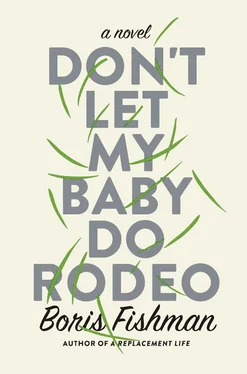Then six months arrived, it was time for more solid foods, and the breast milk predicament was concluded. Maya wondered if this, now, would mean intimacy and attachment; it meant inconceivable boredom. She actually longed to squeeze tits at the hospital. Eugene and Alex had insisted on prolonging Maya’s permitted maternity leave, and she resented them for it. A howling emptiness from eight to six — she could not wait for Alex’s stories of import battles with Customs — mitigated only by the appearance of Raisa around nine in the morning. Maya’s social circle had somehow signed up a mute newborn and a logorrheic mother-in-law, and thrown out what few others it had. Maya imagined that she was slowly becoming Raisa. She was becoming the woman who bustles. She stared at the older woman and asked: What distinguishes me from this woman? We both live in this home, more or less; we both spend the day in the kitchen; we both watch Alex Rubin for signs of distress.
She tried to read books, but it was impossible to focus with Raisa addressing her at five-minute intervals. (The undeclared price for Raisa’s helping was full-time interaction.) So Maya researched boredom. The Internet (Raisa was slightly fearful of the Internet and hesitated to disrupt Maya’s work at it) recommended the Eastern solution, which was the opposite of the Russian solution. Go deeper into the boredom. Maya could hardly understand what that meant. She sat with her eyes closed and tried to “go deeper into the boredom.” Invariably, she imagined boredom as a dreary, wet wine cellar and she just had to keep going deeper into it. Not much came of all this.
Did all adoptive mothers feel this punishment, to remain aloof from their children in some unnameable but undeniable way all because they had not birthed them? If so, how did they bear it? Did they close their eyes to this truth, or persuade themselves out of it? Or maybe this was Maya’s affliction alone? Maya could not speak about what she felt to Alex or even Raisa. To the news that a woman who logged so many hours next to the child felt unclose with the child, the Rubins would only purse their foreheads and say: “But you’re with Max all the time.” Alex cooed to the child when he came home; Eugene shadow-boxed with the tiny bundle in the crib; and Raisa insisted at periodic intervals that Maya hand over the baby. But Raisa preferred to cook and scrub, and the men retreated as soon as they completed their routines. Even when the house was full, Maya was alone with Max.
Maya experienced this as part of the problem — she felt distance with Max because they felt distance with Max — until the afternoon of an otherwise usual weekday. Max was napping. Raisa was scrubbing. Staring into the refrigerator, Maya detected an unexisting need for milk and fresh greens. She only wanted out of the house — anywhere. She asked if Raisa would keep an ear out for Max’s monitor and went off in the older Corolla they drove then — to the Russian grocery store she could manage to drive. She was holding two loaves of bread in the aisle. She could have been there for ten minutes or forty. Suddenly, she experienced a ravaging desire to be next to Max. She remained in place — she feared it would vanish when she moved. She needed to touch him, not the loaves. Finally, she dropped the bread to the floor, left her half-filled basket in the aisle, and ran out of the store, as if unsure would he be there when she reached home.
Storming into the house, she was out of breath, her hair half out of its ponytail. Maya pretended she was dying for the bathroom. But you didn’t buy anything, Raisa asked her back. It was closed, Maya lied. Instead of the bathroom, Maya went for her son. As she looked at Max, sleeping, she imagined that he knew the truth — about why she went, why she returned, why empty-handed. He was so solid and strong, her child, the unperturbable sleeper, that he could forgive a mother who found him foreign. And this brought her closer to him. Adoptive mothers seek out explanations that birth mothers do not. Maya’s was: She and Max constituted a family of their own — a family within the larger family. They were together, alone.
The Rubins came around. The boy was unique — because the Rubins were unique, because they had crossed an ocean and set themselves up from zero on a new shore, and now they had multiple cars and multiple homes and an import business that might never take authoritative hold of Customs regulations but would cross the million-dollar mark in revenue each year all the same. Approaching Max with shyness and embarrassment, as they had when he was an infant, was a luxury of easier days, when they could afford to indulge their anxieties instead of the family’s need for cohesion. The black halo that accompanied Max’s arrival in their lives — he wasn’t their blood — would never leave their cognizance, but they would save Max from its ever entering his. And this omission — was it not aided by the possibility that here was a recessive gift from the venturesome depths of the family gene pool? While the Rubins would admit to nothing other than delirious rage at the fair-haired Slavs who had made their lives so painful in the Soviet Union, the back springs of at least Eugene’s mind purred with satisfaction at having such an unquestionable goy join their team. Next to the Rubins, Max was like a bleached sun crashing through a dark copse. Each of them made their adjustments.
Frank led Maya back to the bus like a grieving widow — the field sloped down to the road about a hundred feet from where they had climbed the bank. She felt his warped fingers at her elbow like a burning spot; the Russian superstition against touching deformity burned it a second time. Because of Maya Rubin, the 10:12 to New York City left with delay. The mounting passengers avoided her gaze from the front seat, where she had been deposited by Frank, dirty and disheveled, her hair sprung from its ponytail, her hair band sacrificed to the climb.
Raisa was right; the night proposed only loss-filled reflections, but what if, in fact, a loss had occurred? Wasn’t the night the ideal setting just then? As the bus touched off, Maya said temporary farewell to her son. She slept the entire way home.
At Acrewood, Maya felt a palm on her shoulder. The bus was idling, the door open to a better-lit night. “It’s Acrewood, isn’t it?” Frank said. Drowsily, she roused herself. Her breath was sour and something was aching after being suspended awkwardly for an hour.
“You owe me a return ticket,” Frank said. “And laundry services. And a new hip.”
She embraced him. He laughed, embarrassed, but then eased into it. “You go ahead now,” he said shyly from her collarbone.
“Stop smoking, Frank.” She released him and took the stairs down to the ground. It was a day of exiting buses with hands empty. She heard the doors close behind her and felt the smeared pockets of her capris. With great belatedness, she discovered that she had taken nothing — not her bag, nor wallet, nor cell phone. Frank was disengaging the brake, the bus about to roll forward, when she spun around and banged on the glass of the door. Wearily, Frank opened the door.
“Let no one say the bus line is not a full-service operation,” he sighed when she told him the reason. He extended a flip cell phone. As she dialed, he spoke an apology into the microphone.
Maya knew what would greet her on the other end of the line — she had sent no word for three hours, her cell phone ringing uselessly in her purse in the front hallway closet. She was rebuked like a schoolgirl, first by Alex, who threw down the phone, then by Eugene, whom she heard exclaiming in the background, and finally by Raisa, who picked up after Alex. Only then was she told that her son had been returned home just minutes after her bus had pulled away from the curb, whereupon Alex’s cell phone rang with the jubilant news; whereupon Alex began dialing his wife, only to speak to his mother again once she traced the tinkle of Maya’s cell phone to the front hallway closet.
Читать дальше












